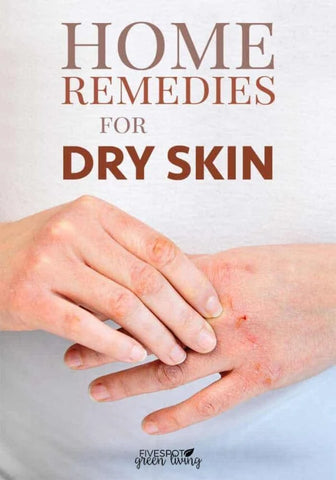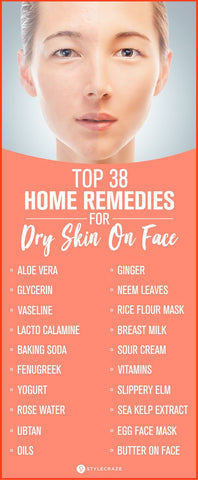Tips for Relieving Dry Skin in Winter
9 Home Remedies for Dry Skin – Soothe Dry and Flaking Skin Naturally
Home Remedies
Colder temps often lead to dry indoor air, and with dry air often comes dry skin and chapped lips. I've pulled together 9 home remedies for dry skin, along with tips for avoiding dry skin year-round. From coconut oil to backyard weeds, we'll help relieve winter dry skin and eczema and sooth itching and cracking.

#1 – Coconut Oil
Coconut oil is a much loved moisturizer for many. It may work best when applied at bedtime and allowed to soak in overnight. Eating it may be even more helpful. My personal favorite is Nutiva coconut oil, which tastes like fresh coconut.
Some people do find coconut oil to be comedogenic (pore clogging) – others do not. (I use it daily and do not have any problems.) Some find that it wears off too quickly, which is why I like to use option #2 – hard lotion bars.
#2 – Hard Lotion Bars
A couple of times per year, I mix up a batch of hard lotion bars. Hard lotion bars are a moisturizer that is hard at room temperature, but melts when it is warmed by your body heat. To use, you simply hold the bar in your hands to warm it, or rub against the area that the want to treat. These bars have a great shelf life and don't require refrigeration like some homemade creams and lotions. They're also great to slip into a baggie and pop into your purse, because they won't spring a leak like a lotion bottle might.
Beeswax and cocoa butter team up to trap moisture naturally without harsh chemicals, and combine with olive oil or coconut oil to moisturize your skin. You can check out the recipe in the post “Super Easy Hard Lotion Bars“. This recipe also makes a great lip balm for dry, chapped lips. If you use cocoa butter, it smells like chocolate! 🙂
#3 – Birch Tea
Birch tea is recommended in Backyard Medicine for the relief of skin conditions such as eczema and herpes. The tea may be made using fresh or dry birch leaves. To make the tea, cover four of five birch leaves with one cup of boiling water. Steep for five to ten minutes. For eczema, drink one cup of tea three to four times per day and apply the tea as a compress to the affected area. To make a compress, dip a soft cloth into the warm or cooled (not boiling) tea and apply to the skin.
#4 – Dandelion Leaf
America's most hated lawn weed is like a mini-pharmacy in flower form. Dandelion leaf is suggested for an herbal bath in the book Dandelion Medicine. The author states that this bath is good for eczema and dry, oil, or itchy skin. As a detoxifying agent, it may also by helpful to those who are trying to lose weight and those with yeast or fungal infections.
All you need is:
- 1 pint of water
- 2 heaping teaspoons of dried dandelion leaves – or – 1 handful of fresh dandelion leaves
Simply bring your water to a boil, then pour it over your leaves. Cover (to contain volatile compounds) and let steep for 30 minutes. Strain out the leaves and add the tea to a warm (not hot) bath. Soak until the bath cools, or as long as you like. If you don't have dandelion leaf available, you can purchase it online via Starwest Botanicals or through other herbal sources.
#5 – Oatmeal Bath
There are several different options for using the soothing, nourishing powers of Avena sativa (oats) to your bath. You can buy a premade product like Aveeno Soothing Bath Treatment or soap. You can bundle up a handful oatmeal in a mesh bag and hang it in the stream of your bath water water (add some chamomile for extra soothing). Squeeze the bag gently to release even more of the soothing oat milk. Another option is to finely grind your oatmeal in a blender or food processor and sprinkle directly into the bath water. Oatmeal may also be combined with milk (2 cups per bath) or baking soda (1 cup per bath).
#6 – Herbal Bath
Adapted from 1001 Natural Remedies “Herbal Bath for Dry Skin”
Use 2 Tablespoons Each:
- Comfrey Leaf
- Marshmallow Root
- Rose Petals
- Chamomile
Place the dried herbs in a double layer of cheesecloth or mesh bag and place in the bathtub while it is filling. Comfrey and marshmallow help soften dry skin, while rose petals and chamomile sooth and add a lovely fragrance.
#7 – Vanilla Body Cream
Adapted from “Do It Gorgeously: How to Make Less Toxic, Less Expensive, and More Beautiful Products“
This simple 4 ingredient body cream goes together in a flash in the food processor and keeps for around 6 months in the fridge.
Simply blend:
- 2 tablespoons shea butter
- 2 tablespoons virgin coconut oil
- 4 tablespoons sweet almond oil
- 1/2 teaspoon pure vanilla absolute oil
Store in a dark glass jar. Makes about 4 ounces.
#8 – Tallow Balm
Grass fed beef tallow is high in micronutrients that nourish skin, and can be made into a silky skin cream when combined with olive oil and a skin soothing essential oil. Check out the post “Nourishing Tallow Balm” on GNOWFGLINS for the recipe and instructions.
#9 – Glycerin
Two users on Earth Clinic recommend glycerin for dry skin. One applies it mixed half and half with water, the other applies it full strength. They suggest applying at bedtime and letting it soak in overnight.

Tips for Avoiding Dry Skin
Drink Plenty of Liquid – avoid sugary sodas, juices and caffeine, which may make skin conditions worse. Look to water, herbal teas, and water kefir for hydration. Infuse some fruit or add a splash of citrus or a sprig of mint to make plain water more appealing.
Eat Healthy Fats – Fats are essential for our health and well-being. They help hold moisture in our skin, keeping it supple and soft. Choose your fats wisely. Avoid damaged fats such as hydrogenated oils, interesterified fats, and liquid vegetable oils such as corn, soy and canola (most of these are chemically processed and genetically modified). Look for fats that are naturally solid at room temperature for cooking, such as butter, coconut oil, sustainably harvested palm oil, lard, tallow and poultry fat. for non-heated applications, use extra virgin olive oil, or flaxseed or walnut oil. Keep the flaxseed and walnut oils in the fridge, as they will go rancid quickly. Fish oil and cod liver oil are also good.
Keep Warm, Not Hot – Hot showers, although they may feel great, will dry out winter skin even more. Stick to warm or cool water.
Wash Less and Use Gentler Cleaners – I'm not talking about going completely “campy”, but consider showering less frequently and only using soap on the stinky spots. I'm guessing that most of us do not have elbows that require a heavy duty soapy scrubbing. Opt for milder soaps and cleansers. Soap acts as a surfactant, breaking up and washing away dirt, grime and oils – including our natural skin oils. Many cleansers/soaps on the market are also filled with a cocktail of chemical fragrances and other questionable ingredients. Keep it simple and keep it as natural as possible. You may even want to consider going “no poo” or making your own soap.
I hope you find this post useful. Please Pin, Share, Stumble or otherwise pass this post along if you like it. Happy readers are our best advertising!







Leave a comment